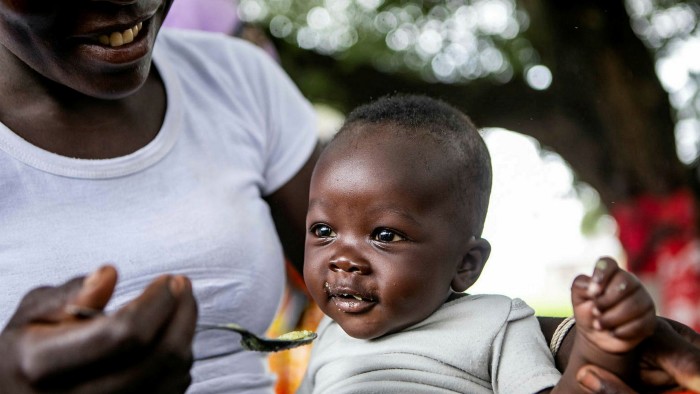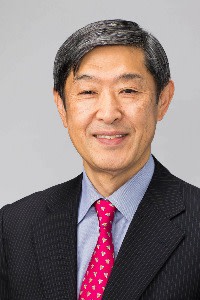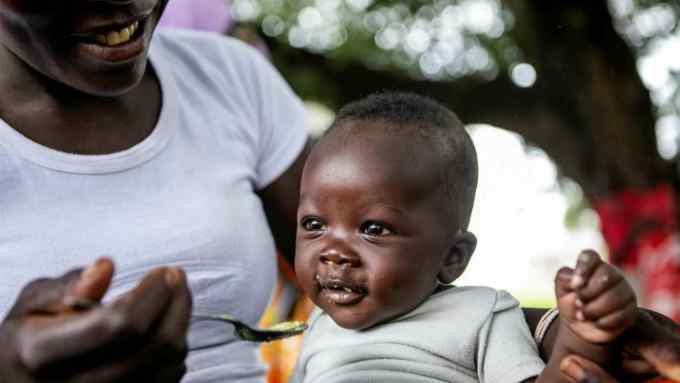Japan follows UK’s lead in securing child nutrition against Covid

Roula Khalaf, Editor of the FT, selects her favourite stories in this weekly newsletter.
“Human security” is defined by the UN as the right to live in dignity, free from fear and want. Governments are required to protect individuals’ rights to life, livelihood, and dignity and build resilient societies. And, we at the Japan International Cooperation Agency (JICA) — an implementing organisation of Japan’s official development assistance programme — have set human security as a key pillar of our mission. We are working with partners to seek a free, peaceful and prosperous world.
Nutrition is one of the most important foundations for human security, due to its impact on all children’s ability to live with dignity. This means ensuring not just access to food, but to good nutrition. It means taking measures against poverty, and providing children with health, education, and protection.
To empower individuals to address their nutritional needs, the global community — and each country — should establish a social system that protects children from malnutrition and ensures a healthy future. However, Covid-19 has greatly threatened people’s right to life, livelihood and dignity through malnutrition, poverty, and education loss. A UN report estimated that Covid-19 could have pushed up to 132m people into hunger by the end of 2020.
It is vital to act decisively to reverse these worsening malnutrition trends, which can contribute to non-communicable disease, and increase the risk of severe Covid-19.
Covid-19 is worsening malnutrition
One-third of the world’s 700m children under five suffers malnutrition. Some 149m still suffer from nutritional stunting, 50m from wasting or acute malnutrition, while 40m are overweight.
Children who do not receive quality nutrition during their first 1,000 days of life are more susceptible to retarded brain growth and more likely to develop weakened immune systems, increasing the likelihood that they will contract infectious diseases.
Nutrition interventions in those first 1,000 days are essential to support children’s growth and development, even during this pandemic.
The UK as a leader on global nutrition
The UK has led the world in combating global malnutrition, convening countries, international organisations, businesses, and civil society. It helped to establish the Scaling Up Nutrition movement in 2010. The UK’s Department for International Development (DfID) — now the Foreign, Commonwealth and Development Office (FCDO) — contributed significant aid for nutrition programmes in 2020 to reach 50m vulnerable people, primarily in Africa. We commend the UK for such commitments. While the FCDO’s budget has decreased this year, we believe such cuts are only temporary and that the UK will return to leading the world on nutrition with increased funding in the aftermath of the pandemic.
Japan’s efforts to tackle global malnutrition
Japan, itself, faced food shortages and malnutrition in the aftermath of the second world war. In response, it established policies to increase food production, introduced a National Health and Nutrition Survey, developed the Maternal and Child Health (MCH) Handbook, created a school lunch programme, and expanded the roles of national dietitians and public health nurses.
Given this experience, JICA has worked with developing countries such as Madagascar to institute a school lunch scheme based on local resources as part of an education programme — not just to address malnutrition, but also to provide opportunities for education, to reduce local poverty, and to contribute to social stability.
Japan has also improved its nutritional status by embedding prenatal to infancy nutrition education within maternal and child health services. Through the MCH Handbook and complementary feeding classes, mothers in Japan have received nutrition counselling and breastfeeding guidance since the postwar period began. The MCH Handbook provides mothers with vital information regarding nutrition for themselves and their babies, and includes their health records as well as child growth records. Children in Japan receive well-balanced school lunches and food and nutrition education (“shokuiku”) to cultivate health consciousness and good dietary habits.
Based on the lessons of these experiences, JICA is collaborating with international partners to address malnutrition in developing countries. In 2018, in partnership with the UK’s DfID, JICA produced 130,000 MCH Handbooks in Ghana. Additionally, in 2016, JICA and partners launched the Initiative for Food and Nutrition Security in Africa (IFNA), in partnership with the New Partnership for Africa’s Development, now the African Union Development Agency. It aims to establish a framework for collaboration with African governments to improve nutritional status through multi-sector approaches that combine best practices in health, agriculture, education and other relevant sectors.
Way forward for the Tokyo Nutrition for Growth Summit
Japan is looking forward to hosting the Tokyo Nutrition for Growth Summit 2021 in December. The summit was established under the leadership of the UK government, and announced at the 2012 London Olympics. The UK called on global partners to come together to tackle global hunger and malnutrition.
With the understanding that good nutrition is foundational to achieving human security, Japan is partnering with countries to improve their nutritional outcomes to enable all children to grow and thrive. JICA looks forward to strengthening its partnerships, particularly with the UK government, to accelerate global nutrition programming.
As the world continues to face a sharp rise in childhood malnutrition, spurred by Covid-19, countries must join forces for a co-ordinated response. With the UK’s strong record on global nutrition, we look forward to continuing to see the UK lead and serve as a crucial partner in improving global nutrition.

Shinichi Kitaoka is president of the Japan International Cooperation Agency and professor emeritus at the University of Tokyo, specialising in modern Japanese politics and diplomacy. He was Japan’s ambassador to the UN from 2004 to 2006.
Read his full essay on the Unicef website, here

Comments